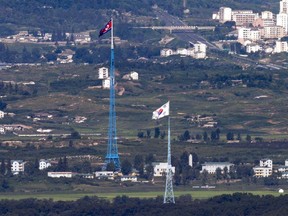Article content
SEOUL, South Korea (AP) — South Korea said Monday it plans to launch its first domestically built spy satellite at the end of this month to better monitor rival North Korea, as the North pushes to expand its arsenal of nuclear weapons targeting its adversaries.
The plan was unveiled days after North Korea failed to follow through on its vow to make a third attempt to launch its own reconnaissance satellite in October, likely because of technical issues.
Article content
Jeon Ha Gyu, a spokesperson for the South Korean Defense Ministry, told reporters Monday that the country’s first military spy satellite will be launched from California’s Vandenberg Air Force Base on Nov. 30.
The satellite will be carried by SpaceX’s Falcon 9 rocket. Under a contract with SpaceX, South Korea plans to launch four more spy satellites by 2025, according to South Korea’s Defense Acquisition Program Administration.
South Korea currently has no military reconnaissance satellites of its own and relies on U.S. spy satellites to monitor moves by North Korea.
The possession of its own spy satellites would give South Korea an independent space-based surveillance system to monitor North Korea in almost near-time. When operated together with South Korea’s so-called three-axis system — preemptive strike, missile defense and retaliatory assets — the country’s overall defense against North Korea would be sharply strengthened, according to Lee Choon Geun, an honorary research fellow at South Korea’s Science and Technology Policy Institute.
Lee said that U.S. spy satellites produce much higher-resolution imagery but they are operated under U.S. strategic objectives, not South Korea’s. He said the U.S also sometimes doesn’t share satellite photos with highly sensitive information with South Korea.
Article content
Last year, South Korea used a homegrown rocket to place what it called a “performance observation satellite” in orbit, becoming the world’s 10th nation to successfully launch a satellite with its own technology.
But Lee said it’s much more economical to use a SpaceX rocket to fire a spy satellite from the Vandenberg base. Other observers say a SpaceX rocket would be more reliable to carry the South Korean spy satellite, which is heavier than the satellite launched in 2022.
North Korea is also eager to acquire its own spy satellite. But its two launch attempts earlier this year ended in failure for technical reasons. The country said it would make a third attempt sometime in October, but it did not do so and its state media has not provided a reason.
South Korea’s spy agency told lawmakers last week that North Korea is likely receiving Russian technological assistance on a spy satellite launch program. The National Intelligence Service said North Korea was in the final phase of preparations for its third launch, which the NIS said would likely be successful.
South Korea, the U.S. and other foreign governments believe North Korea is seeking sophisticated weapons technologies from Russia to modernize its nucler and other weapons programs in return for supplying ammunition, rockets and other military equipment to support Russia’s war in Ukraine.
Article content
The possession of spy satellites is part of ambitious arms build-up plans announced by leader Kim Jong Un in 2021. Kim said North Korea also needs more mobile intercontinental ballistic missiles, nuclear-powered submarines, hypersonic weapons and multi-warhead missiles to cope with intensifying U.S. military threats.
After the North’s first, failed launch in May, South Korea retrieved debris from the North’s satellite and concluded it was too crude to perform military reconnaissance. Lee said the North Korean satellite would still be capable of identifying big targets like warships so it could be militarily useful for North Korea.
Share this article in your social network

Comments
Postmedia is committed to maintaining a lively but civil forum for discussion and encourage all readers to share their views on our articles. Comments may take up to an hour for moderation before appearing on the site. We ask you to keep your comments relevant and respectful. We have enabled email notifications—you will now receive an email if you receive a reply to your comment, there is an update to a comment thread you follow or if a user you follow comments. Visit our Community Guidelines for more information and details on how to adjust your email settings.